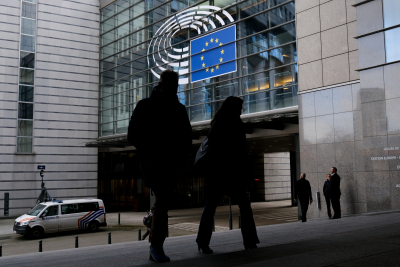Politico have just published a story which alleges that Markus Ferber, a Member of the European Parliament, may have breached Parliamentary ethics rules. The story claims that Ferber, who was the lead negotiator for the Markets in Financial Instruments Directive (MiFID II) and is currently a Vice-Chair of the Parliaments Committee on Economic and Monetary Affairs (ECON), may be involved with two organisations offering services connected to the directive. According to the Politico piece, Ferber seems to have used his Parliamentary email and office to promote financial products connected to the MiFID II directive among the asset management community.
The MiFID II directive, which Ferber negotiated, is the EU legislation that regulates firms who provide services to clients linked to ‘financial instruments’ (shares, bonds, units in collective investment schemes and derivatives), and the venues where those instruments are traded.
From the evidence provided by Politico it seems like Ferber has breached the Code of Conduct of the European Parliament. His alleged actions are not in accordance with Article 1 of the Code that stipulates that Member should “act solely in the public interest and refrain from obtaining or seeking to obtain any direct or indirect financial benefit or other reward”. Any involvement with PeoplesFinancials (which Ferber founded) or Cfinancials (for which Ferber seems to be at least acting as a door opener) is not declared in his current (or any previous) declaration of financial interests. This would be in violation of Article 4 of the Code of Conduct, regardless if his activities are remunerated or “pro bono”. Ferber appears to be using both his Parliamentary email and signature as well as the Parliament premises for the potential benefit of both his foundation and the company of his business associate that controls his foundation.
“If the allegations are true then perhaps Mr Ferber needs to be reminded about the difference between constituents and customers and between his Brussels office and a bazaar.” – Daniel Freund
In the United States, using the name of a member of congress for any purpose by an outside organisation is prohibited. Members of the US congress are also not allowed to pursue any paid for outside activities or board memberships. The language in the European Parliament’s Code of Conduct does not have the same clarity, but given Ferber’s role in the legislative process on MiFID II and the activities he suggests in a letter to asset managers and his possible involvement with Cfinancials, there is at least a heightened risk of a conflict of interest.
Transparency International EU asks the European Parliament to clarify without delay what Ferber’s role with the two organisations is or has been. Should the Code of Conduct indeed have been breached it should sanction Ferber. But the case also points towards shortcomings of the current Code of Conduct that should clearly prohibit members from using their elected office for their personal business dealings. MEPs and their offices cannot be for sale. The current system of declaring outside activities is insufficient and this case clearly shows that there is a complete lack of oversight and checks on the declarations of MEPs.
The committee overseeing ethics violations has previously made recommendations in at least 12 cases in which the Code had been breached. Not a single member, however, has been sanctioned by the President of Parliament. The committee is currently composed of five sitting MEPs from the five biggest political groups. This means MEPs are judging on potential ethics violations by their colleagues.
“The current code of conduct does not go nearly far enough to prohibit Members from using their position and Parliamentary premises for their own business dealings. The Parliament must investigate these allegations without delay.” – Daniel Freund
Transparency International EU had recommended to make the committee more independent and less political. The committee should also be able to initiate inquiries (rather than wait for a referral by the president which might never come) and issue binding sanctions in cases in which the Code has been broken. All final decisions by the committee should also be made public. Currently not only deliberations, but also all recommendations are kept secret and cannot even be accessed through access to documents requests long after decisions have been taken.
Transparency International EU has also filed three complaints against MEPs violating the Code of Conduct in July.
Update: Transparency International EU has submitted a complaint relating to this case to the President of the European Parliament on 21 July 2017.




